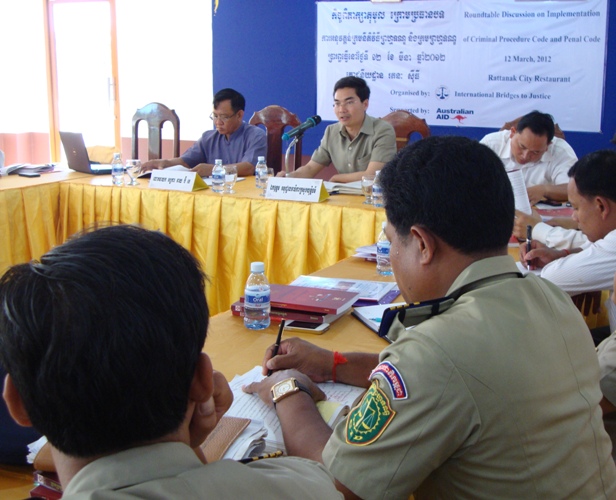
and Nastasia Bach
On 12 March 2012, International Bridges to Justice (IBJ) held its first roundtable discussion for the year in Banlung, Rattanakiri Province. The event was attended by 18 justice stakeholders including the Deputy Prosecutor together with a representative of Womens Affairs, Cambodian Centre for Human Rights, Legal Aid Cambodia, and prison and police staff.
Mr. Ouk Vandeth, IBJ’s In-Country Fellow, opened the Roundtable by explaining the purpose and goals of the morning. He requested that the audience raise the challenges facing them in their daily duties, so that together a solution is found.
His Excellency Bun Honn, the Undersecretary of the Ministry of Justice, facilitated the Roundtable by candidly explaining about the implementation and interpretation of the new Cambodian Penal Code and Procedures Code. He emphasised that Cambodia is a democratic country and as such, must uphold the laws and human rights principles. He explained that the objective and application of the law was to protect the human rights of all Cambodians.
His Excellency opened the discussion by thanking all of the attendees and urged them to voice their views on the legal system’s inefficiencies, achievements and ambiguities. Due to changes in the laws and limited training of these changes, His Excellency understands the challenges faced, specifically by police officers, carrying out their duties in accordance with the law. He reminded participants that this Roundtable was one way to assist them in understanding the correct interpretation of the law.
Before questions were asked, His Excellency explained the maximum duration a person can be held in police custody. An extension of this time is limited to an additional 24 hours in cases involving a felony charge and only if further investigation is needed. Moreover, His Excellency explained that an accused may speak with a lawyer or relative after 24 hours of being in police custody. The police then inquired as to what to do if the accused person asks to speak to a lawyer within the first 24 hours. His Excellency explained that if the accused requests a lawyer within 24 hours, then he may see a lawyer. His Excellency went on to explain that the accused has a right not to answer the questions of the Judicial Police and that by exercising this right, the accused should still be presumed innocent.
One difficulty created by the changes in the laws is the amendment to the elements required for proving theft with violence as opposed to extortion with a weapon. A police officer raised concern and confusion between the distinctions of the two crimes, as opposed to the elements under the old system, which was classified as crimes of robbery. His Excellency explained the principles and the importance of understanding the distinction, especially given the difference in the periods for detention for each charge.
His Excellency also discussed the important principles of the presumption of innocence and liberty, something that is not always seen in the Cambodian justice system. He identified the importance of gathering evidence, of analysing the evidence, and reaching informed decisions to ensure that the police are not unnecessarily detaining innocent people. His Excellency stated:
“It is better to have ten suspected men be free than one innocent man in prison”
His Excellency also pointed out that Cambodian people would be less willing to trust the police, and the judicial system, if people were arbitrarily being detained without the proper evidence.
Further discussion throughout the morning touched on topics of breach of trust, the difference between misdemeanors and felonies, domestic violence, defamation, cheating, suspended sentences, the provisional detention of minors and the time period of an offense.
Mr. Vandeth closed the discussion by summarising the main points of discussion and remarked that the correct implementation of the law and legal reform is central to Cambodia’s development. Mr Vandeth was very pleased with the Roundtable. He noted that the audience was very active with lots of questions for His Excellency indicating an enthusiasm to learn and improve practices within the justice system.
This event was supported by Australian Aid.
Kate is a volunteer with the Australian Youth Ambassadors for Development (AYAD) Program. The AYAD Program is part of Australian Volunteers for International Development, an Australian Government, AusAID initiative.
[slideshow post_id=””]